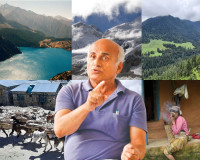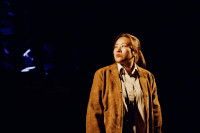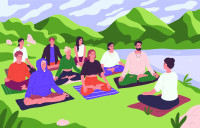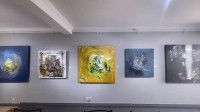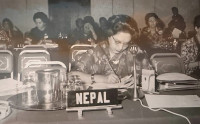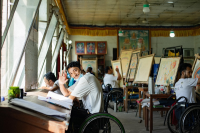Culture & Lifestyle
His first Himalayan call
German ambassador to Nepal Udo Eugen Volz reflects on lessons from history, the importance of dialogue, and his early impressions of Nepal’s resilience.
Sanskriti Pokharel
For Germany’s ambassador to Nepal, Udo Eugen Volz, Nepal marks both a new chapter and a new continent. Before arriving in Kathmandu, he served as the German Ambassador to Zimbabwe and held various diplomatic postings across Europe and Africa.
In this interview with the Post’s Sanskriti Pokharel, Volz reflects on his first impression of Kathmandu and the shared values that connect Nepal and Germany.
Newly stationed in Nepal and experiencing Asia for the first time, what has been the most interesting aspect of Nepali culture or daily life for you?
For me, the most visible—and perhaps the most meaningful —aspect is the spiritual dimension of daily life here. Walking around Kathmandu, I see countless temples and traditional buildings that reflect a deep cultural heritage. But beyond what’s visible, there’s a sense of devotion and faith woven into everyday routines. Watching people visit temples in the morning or participate in festivals has been a humbling experience.
Could you share a bit about your previous posting in Zimbabwe and how that experience is influencing your approach here?
Moving from one continent to another has been quite a change. Zimbabwe is geographically larger but less densely populated than Nepal, and the rhythm of life is very different. Yet, in both countries, I’ve found warmth and generosity. Zimbabweans were incredibly welcoming and hospitable, and I have seen the same friendliness here in Nepal. For diplomats like us who move every few years, that makes settling in, building connections, and doing our work much easier.
Regarding Nepal-German relations, what areas of cooperation do you see as most promising, and how do you envision strengthening ties between the two countries during your tenure?
Nepal and Germany share a strong and well-established partnership, one that has been tested and proven over the course of decades. That’s an excellent foundation, though it also makes finding new areas for growth more challenging. Our primary focus remains on development cooperation.
As financial resources for development become tighter globally, efficiency and shared responsibility are key. We expect partner countries, including Nepal, to take the lead in sustaining progress. Development cooperation, after all, is about helping people help themselves, and in this case, helping governments take charge of their own development.
Nepal’s expected graduation from least developed country status next year is both an achievement and a responsibility. It’s a sign of progress in areas like energy and infrastructure, but it also calls for continued commitment to build on these gains.
Nepal and Germany recently signed a 41-million-euro technical and financial cooperation agreement. Could you please tell us about this partnership and how the funds will be allocated?
Our development cooperation dates back to the late 1950s, and the agreement we just signed builds on that legacy. The 41 million euros will be distributed over three key areas: health, energy, and sustainable economic development.
Energy remains our largest area of cooperation. Germany has supported Nepal since the early days of hydropower development, from generation to transmission and now to distribution. Approximately half of this new funding will be allocated to enhancing Nepal’s energy network, enabling it to reach more households.
In sustainable development, we’re focusing on expanding opportunities in agriculture and supporting small-scale producers to access markets. In health, we’re continuing efforts to strengthen hospitals, medical training, and access to medication. These programmes are implemented through long-standing partners like GIZ and KfW, and newer institutions like PTB. The cooperation cycle renews every two years, allowing both sides to assess progress and set new priorities.
Not long after you arrived in Nepal, the Gen Z movement emerged, with young people speaking out against corruption. What’s your impression of this generation’s energy and determination for Nepal?
It was quite a surprise. I had only been here a month when the movement began, and I was actually in Berlin for a conference when the protests started.
What struck me most is how this reflects a global trend. In many parts of the world, especially outside Europe, societies have young populations with limited opportunities. That creates frustration. When young people see public resources misused, they react strongly, as they did here. I think this moment revealed both the passion and the challenges of a young generation determined to shape its country’s future.
The fall of the Berlin Wall on November 9, 1989 was a defining moment for Germany and the world. Where were you on that day, and what emotions or memories stand out for you?
At the time, I had just completed the selection process for diplomatic training. Like many Germans, I was deeply moved. The fall of the Wall came after decades of division and Cold War that many thought would never end. I was in West Germany then, and suddenly the prospect of serving a unified Germany felt almost unreal. It was an emotional time filled with both excitement and uncertainty. It was a moment that truly opened new horizons for our nation and for Europe.
Nepal is known for its landscapes—are you planning to visit the mountains or any heritage sites soon?
Not yet, but I’m eager to. I haven’t had a chance to travel outside Kathmandu, but now that the good season is starting, I’m looking forward to it. I won’t be climbing mountains, but I do enjoy hiking and hope to explore places like Pokhara first, then, perhaps, visit some of our development project sites across the country.
Is there any book that best captures how you feel about starting this new chapter in Nepal?
I’ve started reading ‘Nepal 2043’ by Sujeev Shakya. It’s an inspiring book that reflects on Nepal’s progress and envisions a positive future. I find it encouraging because it emphasises self-confidence. It serves as a reminder that Nepal, situated between two large neighbours, should trust in its own strengths.
In Europe, too, smaller countries coexist with larger ones, yet each contributes its own voice. Nepal has that same potential to turn its challenges, such as youth migration, into opportunities. If the knowledge and experience of Nepalis abroad can be brought back home, not just remittances, it could enrich the nation.
What message would you like to convey to the government and the people of Nepal?
Democracy must be nurtured and defended, both from within and from outside. As Nepal marks a decade since its 2015 Constitution, this is also a good time for reflection: to assess how far the country has come and what can be strengthened. Every democracy goes through such self-examination.
Both Germany and Nepal have faced moments of transformation and reconciliation. What matters is continuing to believe in dialogue, reform, and the democratic process.




 8.22°C Kathmandu
8.22°C Kathmandu
